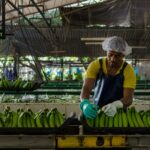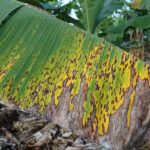Oxfam report takes aim at Ecuadorian, Costa Rican tropical fruit industries

The report "Sweet Fruit, Bitter Truth" has prompted conflicting stories between Oxfam's German arm and certifier the Rainforest Alliance.
Oxfam-DE has alleged inhumane conditions exist on many Costa Rican pineapple farms and Ecuadorian banana operations, in a report that points the final blame at Germany's leading retailers.
In the report, the NGO alleges underpayment, dangerous pesticide exposure and inhumane living conditions across a range of farms, based on 42 interviews with workers in Costa Rica and 180 in Ecuador.
Oxfam highlights how despite rising costs, pineapple prices fell by 45% between 2002 and 2014, prompting questions about what this reduction would mean for worker welfare.
The NGO claimed interviewees worked on pineapple farms affiliated with Agricola Agromonte, Finca Once, Dole Costa Rica, and banana farms affiliated with Palmar, the Rainforest Alliance, Matias Plantage/Tropical Fruit Export S.A., Reybanpac and WWF/Edeka.
The report also referenced other players in the supply chain that source products from some of these companies, including Afrikanische Fruchtcompagnie GmbH, Cobana/Fruchtring, Univeg, Staay Hispa, OGL Food Trade Lebensmittelvertrieb and Edeka Fruchtkontor.
"We are the slaves of the pineapple industry. They do with us what they want. They dismiss us and then they put us under worse conditions again," the report quoted a worker as saying, allegedly from Finca Once.
Finca Once was one of two growers to formally respond to letters from Oxfam, with the other being Tropical Fruit Export S.A. Finca Once president Oscar Arias said he and his executive employees were "shocked and horrified" about the investigation report.
In his response, Arias denied that any workers received below the wages required by law, and emphasized the majority of the farm's Nicaraguan workers were not part of a seasonal labor force but worked regular, daily hours.
He said nobody on the farm earned less than what was required by law, and emphasized extra pay was given when more hours were required.
The Oxfam report took issue with union representatives being denied access to farms as well.
In his response, Arias admitted he had prevented access to the farm for union representatives but said he 'owed' this to the workers and clients as "nobody has access to the company site".
"It hardly bears thinking what could happen if everybody could walk through the farm," he said.
Arias also said fields were sprayed with pesticides at times when there were no workers in the field, which limited the contact between pesticides and people.
In his response, Tropical Fruit Export S.A. general manager Oswaldo Menéndez said there was no record any Oxfam representative visiting Farm Matias.
"Matias is a farm that respects the Ecuadorian laws, the statement that wages are not sufficient to feed a family is subjective," Menéndez said.
"The workers have different level [sic] of wages depending on the work but nobody makes less than the minimum wage established by the government," he said, also denying allegations that workers had put in more hours than they had to and were not paid for it.
"The wage issue is heavily regulated in Ecuador so this allegation is completely unfounded."
In general terms, the NGO alleged a "climate of fear" inside Ecuadorian banana plantations for anyone who spoke about unions, citing cases of firings when unions were established, and the existence of union member blacklists.
Menéndez said his company was not against unions but his workers had not formed one.
"The farm is not doing anything to stop them from forming one," he said.
Oxfam also alleged men earned wages that were a third higher than women's wages on the Matias Farm; another claim Menéndez denied.
In another response, the Rainforest Alliance and the Sustainable Agriculture Network (SAN) said they took the allegations in the report very seriously.
"Meeting the challenges of environmental protection, workers’ rights, and improved livelihoods are at the core of the missions of the Rainforest Alliance and the SAN," they said in a statement.
"Many of the points raised by the Oxfam-DE report would be in breach of the critical criteria set out in the latest version of the SAN Standard (adopted September 2015). Therefore, if the investigatory audits commissioned by SAN find evidence to support the claims in Oxfam’s report it would lead to the decertification of the farm or farms in question immediately.
"The investigative audits we have done so far have not found supporting evidence, and we cannot corroborate Oxfam’s allegations. Our investigations are ongoing and we are determined to verify if indeed the allegations made by Oxfam-DE are accurate."
Rainforest Alliance and SAN claimed the Oxfam-DE report's allegations were based on interviews with workers, whereas their investigations were based on a "multi-pronged approach" used by other certification initiatives in the ISEAL Alliance and many respected ISO auditing systems.
However, Oxfam said its report was not only based on worker interviews but involved farm managers, experts, unions, government representatives, parliamentarians, academics and NGOs.
Oxfam also said that even though the majority of the farms were Rainforest Alliance-certified, its purpose of the report was not to check compliance with certifications but to assess working conditions on farms that produced bananas and pineapples for the German market.
In reading Rainforest Alliance's response, Oxfam said there seemed to exist an agreement that many problems on the farms and with workers were "systemic" in nature and cannot be solved by certification and certification standards.
To resolve these systemic issues, Oxfam said it was essentially that supermarkets pay their suppliers prices that at least cover the costs of sustainable production, including living wages.
Photo: Oxfam












































